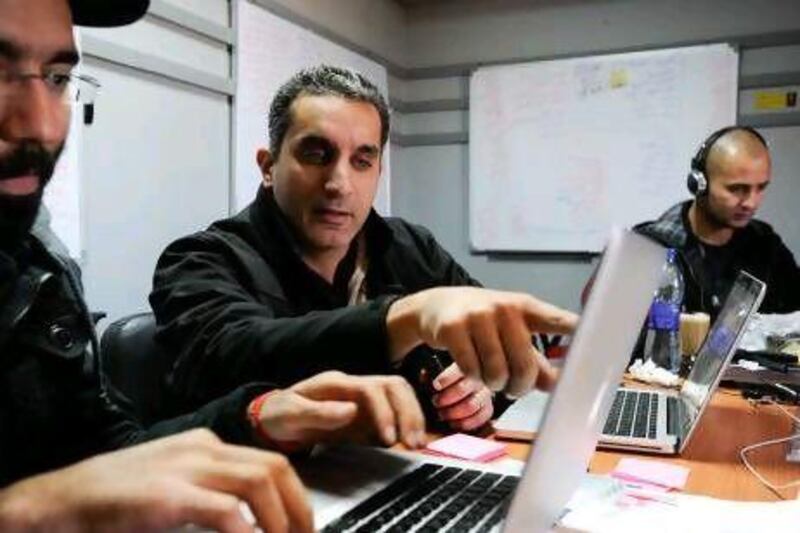Bassem Youssef spends most of his day in a cramped room lined with whiteboards, poring over YouTube with a team of interns. Each week, they select clips from hours of news footage that exemplify the "deceit and hypocrisy" Youssef says is so prevalent in Egypt's television news.
Galvanised by what he saw as the local news media's surreal coverage of last February'surprising, Youssef started a five-minute show on YouTube in April to expose misleading news reports. The 38-year-old cardiothoracic surgeon modelled his parody programme, The B+ Show, on The Daily Show with Jon Stewart and The Colbert Report.
"I keep reminding people of the deceit, because some of the same people who were lying to [viewers] during the 18 days are still here pretending to to be on the side of the people, but they are still lying to you," he said, adding: "I hope I am creating a new form of journalism [in Egypt]."
Handsome, with salt-and-pepper hair and bright blue eyes, Youssef even looks a bit like the Daily Show host, of whom he is an unabashed fan. He was an instant hit; each "webisode" collected between half and three-quarters of a million hits.
It took three short weeks before Youssef received offers from domestic satellite channels, Al Jazeera and MBC, but he launched the half-hour long El Bernameg (The Programme) show last Ramadan on ONtv, an independent, secular Egyptian station.
It's little wonder Egyptians flocked to the show. In a media landscape dominated by call-in talk shows and slapstick comedy, Youssef offered viewers something different.
"I can't say anyone is eager because nobody knew this style of comedy, but I think they are eager for something different. So many people hate this show, and don't think it's funny, and don't get the message, but they still watch."
For Youssef, it's a delicate line between sarcasm and insensitivity. He relies on strong messages about the media to guide the show through tumultuous events. After the deaths of 74 fans at a football match in Port Said, Youssef set aside the wit in his most recent episode, instead interviewing Awais Ahmed, a journalist and sports critic, about the tragedy.
In the days after the January 25 anniversary, Youssef went after television hosts who he says have "bored" him with their constant fear-mongering. The programme shows clip after clip of commentators predicting that the anniversary would create "civil war", bring "anarchy" to the country, attract "foreign hands" hoping to destabilise the country and set Cairo aflame. Instead, the day passed with non-violent protests throughout the country.
Youssef holds his palms up and tells viewers: "The bottom line is, every time the stock market falls, tourism drops or the economy falls, we don't really notice. It's only when the scare scenarios happen. We left people in Tahrir, though it was frightening. This is what happened."
The financial reporter Sherif El Rahman appears on screen: "The stock market reaches a six-year high after Egyptians celebrated the 25th of January peacefully."
"Really?" Youssef says, chuckling. "The revolution ruined the country? The revolution is the cause of everything? Please, next time you hear a scary prediction, remember who used to do the same thing." He shows a clip of a woman wearing a veil and sunglasses being interviewed at a protest.
She says: "I am reporting, we will have a terrible earthquake and a lot of people will die if Mubarak doesn't come back to rule Egypt, Egypt will be conquered. I'm telling you what I saw."
Youssef comments: "This woman says something and we laugh at her. But the disaster is, when the system repeats the same thing in the same way, you believe it. Next time, remember that you have a remote.
"Because we're so involved, we see the tactics and how the news trickles down from a certain programme to another programme and another; the same wording exactly ... Suddenly, the military council is repeating it, and it's not true and the whole society is repeating this ridiculous theory," he said.
On air, Youssef has much of Stewart's smirking delivery. In person, he alternates between utter seriousness and near silliness, putting on voices and playing with the microphone as his train of thought flits from topic to topic.
Although it is now one of the most popular programmes in Egypt, Youssef's staff remains skeletal - a single editor and a handful of dedicated interns. Each episode takes two weeks to research, write, shoot and produce. That is something he hopes soon to change.
With the current 100-episode contract due to end in April, Youssef is eager to step things up - producing the show four days a week and bringing in a live audience, something rarely seen on Egyptian TV. The team is already in talks about spending June shadowing Jon Stewart's production staff in New York.
"I want to stay there in their 'kitchen' and understand how they do it. We saw something on TV and tried to replicate it, but if you're going to do this live, you need to know more."
As the only Arabic show to make the leap from the web to television, The Programme's success has been phenomenal. In all, Youssef estimates that the show, in both its incarnations, has earned 17 million hits online since it began.
Without the intention of becoming a television celebrity, Youssef created The B+ Show as a stopgap before starting a residency in paediatric heart surgery at the Cleveland Clinic in the US. He never made it to Cleveland, and is now on sabbatical from Cairo University.
Graffiti stencils of his face line the roadside in an upper-class Cairo neighbourhood.
For him, the fast rise to fame is unnerving."The whole fame thing is very scary," he says, "It happened so fast I can't deal, or tell you how I think of myself." As for whether or not he is a social critic, that "is a question you ask someone who has been so full of himself for 10 years. I can't start to cope with this".
He's become a controversial figure in Egypt, where three decades under authoritarian rule has left little space for media criticism or dissent. Indeed, Youssef's critics are as vocal as his fans on YouTube.
"The culture of having a different opinion is not really there yet. One of the drawbacks of a democracy is that you have to listen to an opinion even if you don't like it. We don't have this," he says.
State-owned media, for decades the mouthpiece of Hosni Mubarak's regime, have repeatedly come under criticism for instigating violence and spreading misinformation. Instead of discussing the opinion, Youssef says, upset viewers are quick to attack the host.
"They don't differentiate between attacking an opinion, the guy who said the opinion and the ideology behind the opinion to which the guy belongs."
Three weeks ago, Youssef returned to the set of The B+ Show - a simple desk with images from the revolution plastered on the background set up in the apartment he shares with his wife - to shoot an episode covering the clashes outside the cabinet building. The move, he says, was meant to be a stark reminder that nothing in Egypt has changed since the revolution.
But despite the early success, Youssef is determined for B+ to carve out a similar niche to The Daily Show.
"I hope that some day I will be the person people turn to to get their news," said Youssef.
Follow us on Twitter and keep up to date with the latest in arts and lifestyle news at twitter.com/LifeNationalUAE










